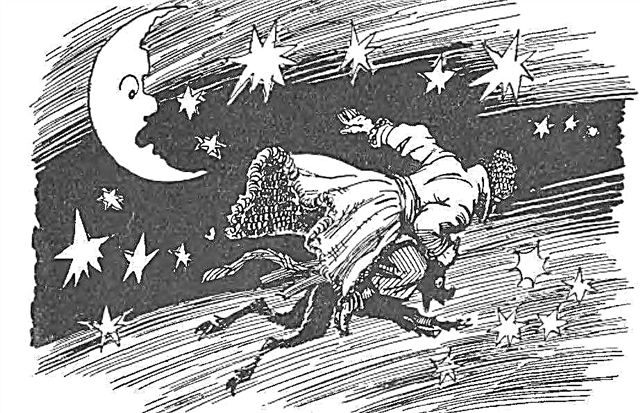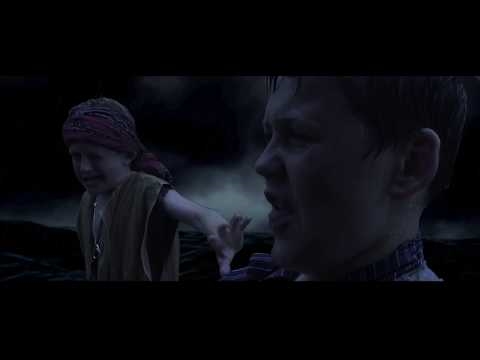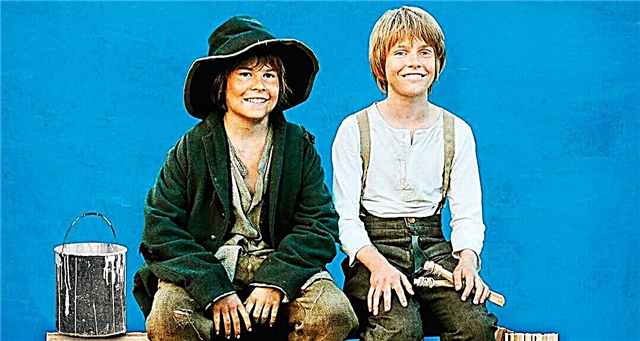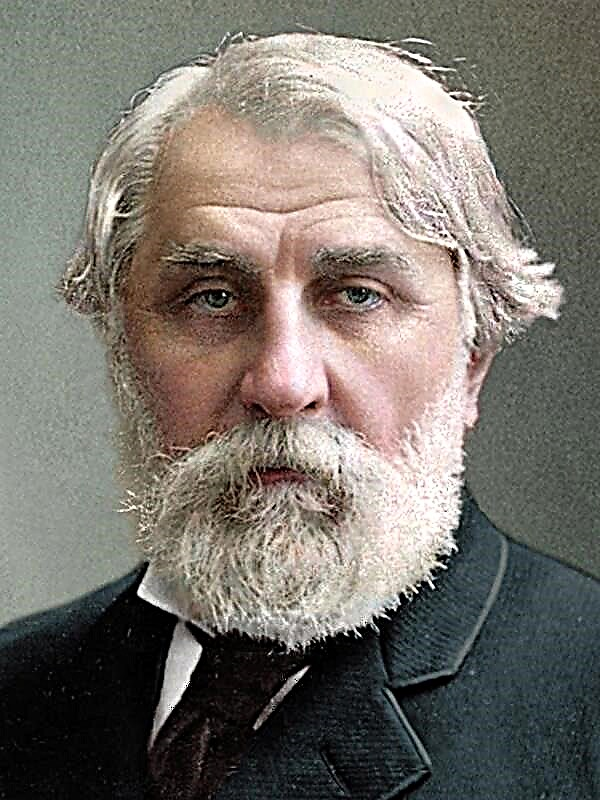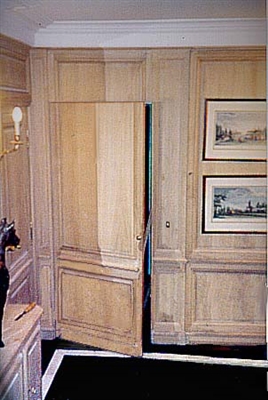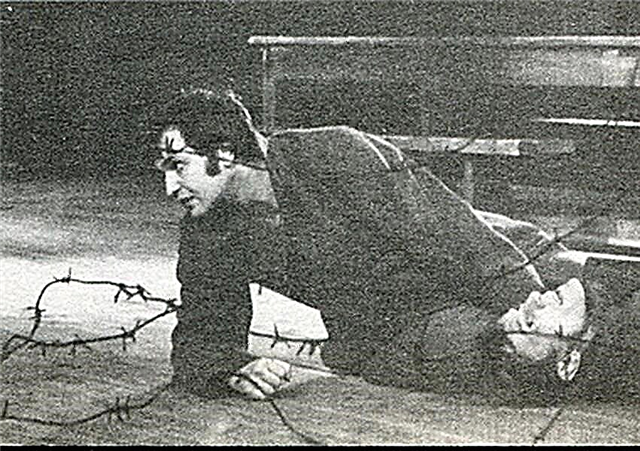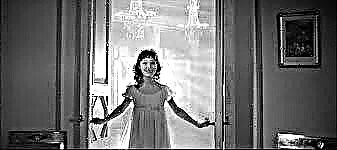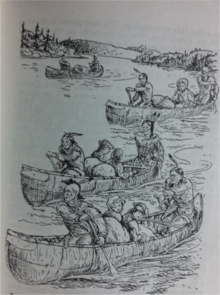The action of this satirical poem takes place during the Hundred Years War between France and England (1337-1453). Some contemporaries of Voltaire said that the author, ridiculed Joan of Arc, treated her more cruelly than the bishop of Beauvais, who once burned her at the stake. Voltaire, of course, laughed mercilessly, he showed Jeanne deceived, portrayed her in the most ambiguous and indecent scenes. But he laughed not at Jeanne d'Arc, not at that girl from the people who, sincerely believing in their patriotic mission sent down by God, led the French to battle with the enemy and fearlessly went to the stake, leaving history with her noble name and her human beautiful appearance.
From the first song we learn that the French king Charles VII is in love with the beautiful Agnes Sorel. His adviser Bonno in a secluded wilderness has a castle, somewhere away from prying eyes, and lovers go. For three months, the king is buried in the bliss of love. Meanwhile, the British prince, Duke of Bedford, invades France. Conscious of the demon of ambition, he "is always on horseback, always armed ... sheds blood, awards to boards, mother and daughter send shame on soldiers." In Orleans besieged by enemies at the council of warriors and sages, a mysterious newcomer from heaven appears, Saint Denis, dreaming of saving France. He says "And if Karl for the girl wanted to lose her honor and the kingdom with her, I want to change his inheritance with the hand of a youth who has preserved her virginity." Warriors laugh him: “to save a fortress through virginity is nonsense, utter absurdity”, and the saint alone goes in search of an innocent virgin.
Lorraine gave France to John, she was born here, “alive, adroit, strong; in clean clothes, with a hand full and muscular, he drags bags ... laughs, works to the light. ” Saint Denis goes with John to the temple, where the virgin "puts on vestments in admiration of steel ... and raves with glory." John on a donkey on horseback, accompanied by a saint, rushes to the king. On the way, near Orleans, they find themselves in a camp of sleeping, drunken British. John abducts from the famous warrior, Jean Chandos, a sword and wide trousers. Arriving at the court, Saint Denis calls on the king to follow this virgin, the future savior of France, who, with the help of the monarch, will expel a terrible and cruel enemy. Finally, Karl is awakened, torn from captivating fun and ready to fight. Together with John, he rushes to Orleans.
The beautiful Agnes, tormented by jealousy, accompanied by Bonno secretly follows them. At night, in the parking lot, she abducts John’s clothes (Chandos’s pants and Amazon’s carapace) and is immediately captured by the British in this outfit, “to complete the hardship, it was Shandosov’s equestrian platoon”. Shandos, sworn to take revenge on the enemy who stole his armor, seeing Agnes, changes his mind, he is overcome by passion ...
John with a large army gives battle to the British, who are defeated. The French commander Dunois, "flying like lightning, is not wounded anywhere, cuts the British." John and Dunois "are intoxicated, they rushed so fast, they fought so wildly with the British that they soon parted with the rest of the army." Having lost their way, the heroes find themselves in the castle of Hermaphrodite. This is a sorcerer whom God created ugly and lustful. He kisses John, but in response receives a mighty crack. The insulted villain orders the guards to put both strangers on a stake. Suddenly appeared monk Griburdon asks to have mercy on John, offering his life in return. His request is accepted. Once in hell, visiting Satan, Griburdon told the following. He, trying to dishonor John, suddenly saw a donkey coming down from heaven and catching the valiant knight Dunois, who, swinging his sword, attacked Griburdon, the Monk turns into a pretty girl - and Dunois lowers his sword. The driver, who was at the same time with the monk and guarded John, when he saw the beauty, rushed to her, releasing the captive. Virgo, being free, grabs a brilliant sword, forgotten by Dunois, and destroys the monk. "The virgin saved her honor, and Griburdon, guilty of blasphemy, said" forgive "earthly existence." The donkey, whom Saint Denis inspired to fly to Lombardy, takes Dunois with him, leaving John alone.
So, where did the flying donkey of the knight Dunois go? He finds himself in the amazing Temple of Rumors, where he finds out about Dorothea, who was sentenced to burning, and hurries to her aid in Milan. The executioner is ready to carry out the inquisitor’s order, but suddenly Dunois appears in the town square and asks the girl to tell everyone about what she is accused of. Dorothea, not holding back her tears, says in response: "Love is the cause of all my sadness." Her lover, La Trimuil, leaving Milan a year ago and going to war, swore her love, promised to marry upon return. Dorothea, having secluded herself, far from the light, endured separation and hid from her prying eyes her baby, a child of love. Once her uncle, the archbishop, decided to visit her niece and, despite the dignity and sanctity of kinship, began to harass her. The crowd ran to the cries of the opposing Dorothea, and uncle, hitting her in the face, said: “I excommunicate her from the church and the fruit of her adultery with her ... I curse them, servant of God. Let the Inquisition judge them strictly. ” So Dorothea found herself at the place of execution. The fearless Dunois struck the archbishop with a sword and quickly cracked down on his assistants. Suddenly, La Trimuil appears on the square, and the beautiful Dorothea is in his arms. Dunois is going on the road, he hurries to John and the king, arranging with a lover to meet in the palace a month later. During this time, Dorothea wants to make a pilgrimage to Loret, and La Trimuille will accompany her.
Having reached the goal of travel, at home of the Virgin Mary, the beloved stay for the night and get acquainted with the Englishman d’Arondel. With him is a young lover, dissimilar to Dorothea in everything. La Trimuil asks the British to admit that Dorothea is more beautiful than his lady. The proud Englishman, offended by this, offers the Frenchman a duel. The Englishwoman, Judith de Rosamor, watches the fight with interest, while Dorothea turns pale with fear for her chosen one. Suddenly, the robber Martinger kidnaps both beauties and disappears faster than lightning. Meanwhile, a duel is going on. Finally, the duelists noticed the absence of the ladies. Misfortune unites them, and two new friends set off in search of lovers. Martinger had already delivered the captives to his castle, a gloomy crypt. There he offers to share a bed with him. Dorothea burst into tears in response, and Judith agreed. God rewarded her with powerful hands, so, grabbing a sword hanging above the robber’s bed, she chopped off his head. Beauties flee the castle and board the ship, which rushes them to the rock of the Fragrance, the haven of lovers. There they meet with their valiant knights. "The brave Frenchman and the British hero, seated on their saddles dear, went off the road of Orleans ... but, as you understand yourself, they remained good friends, and neither the beauties nor the kings could cause a feud between them."
But what about our king? Upon learning that Agnes was taken prisoner, he almost lost his mind, but astrologers and sorcerers convinced him that Agnes was faithful to him and she was not in danger. Meanwhile, once in a castle owned by the confessor of Chandos, she is persecuted by the owner. The young page of Chandos, Monrose, stands in her defense. The monk enters the battle with a page and fails. Monrose is passionately in love with Agnes. Soon, the girl fled to the monastery, but even there she had no peace. In the monastery appears a detachment of the British, who were ordered to capture Agnes. The Britons desecrate the monastery, and Saint Denis, patron of France, advises John to save the monastery, which is overcome by evil. John "full of courage, rages with anger" and the British with a holy spear. And Saint Denis turns to Saint George, the patron of England, with the words: “Why do you persistently want a war instead of calm and silence?”
Returned from the wanderings of La Trimuille with Dorothea. Their happiness is overshadowed, since, protecting Dorothea from the harassment of Chandos, La Trimuille is seriously wounded. And again, Dunois comes to the rescue of Dorothea: he challenges Chandos to a duel and kills him. Soon, Dunois will have to fight with the British, who, having learned about the feast of the French at the Orleans Town Hall, went on a general offensive and steadfastly hold on to battle. "Carl, Dunois the warlike, and Virgo fly at the Britons, pale with anger." British troops, fearing attacks, are in a hurry to leave Orleans. In the chaos of horror and disorder, d'Arondelle and the fearless Judith Rosamor find death. “Daughter of death, merciless war, robbery, which we call heroism! Thanks to your terrible properties, the earth is ravaged in tears, in blood. ”
La Trimuille suddenly encounters Tyrkonel, a friend of the late Chandos, who vowed to take revenge on his killer. Having found next to the graveyard where Chandos was buried, secluded lovers, Tirkonel becomes furious. During the fight, the unfortunate Dorothea rushes to La Trimuille, stained with blood, but he, no longer distinguishing anything, responds to the blow of the Englishman, piercing the heart of Dorothea. The merciless Britt is numb. On the chest of Dorothea, he finds two portraits. One depicts La Trimuil, on the second he recognizes his features. And immediately he recalls how in his youth he left Carminetta waiting for a baby, giving her his portrait. There is no doubt that before him is his daughter. To the cry of the Briton, the people escaped, and "if they had not arrived in time, probably life would have died out in Tirkonel!" He swims to England and, having said goodbye to worldly life, leaves for the monastery. John calls for revenge on the British for the death of a knight and Dorothea. But she was destined for another test. The terrible Griburdon and Hermaphrodite, while in hell, come up with a plan for revenge on the Virgin. At the prompting of Satan they send a donkey to John, in which the demon inhabited, he must seduce her, "since this gang was dirty, that keeps the key under its skirt from the besieged Orleans and from the fate of all of France John." The gentle impudence of the donkey embarrasses Virgo, while Dunois, dozing next to him, hearing a speech saturated with sweet poison, wants to know, "what kind of Celadon made his way into the bedroom, locked tight." Dunois has long been in love with John, but hides his feeling, waiting for the end of the war. Struck by John, seeing Dunois, takes control of himself and grabs the spear. Escaping, the demon flees.
On the way, he comes up with an insidious plan. Once in Orleans, he instills the soul of the wife of the French President Louvet, who fell in love with the great English commander Talbot, not without reciprocity. Bes inspired the lady to let Talbot and his army enter Orleans with nightfall. Madame Louve sets a date for her beloved. Monk Lurdi, sent by Denis to the British, finds out about the upcoming date and warns the king about it. Karl convenes all military leaders and, of course, John for advice. A plan has been developed. First comes Dunois, “the long journey he took was difficult, and is famous in history to this day. Behind him, the troops stretched across the plain towards the city wall. ” Amazed British, defending themselves from the swords of John and her troops, fall into the hands of Dunois, Talbot meanwhile enjoyed a meeting with his beloved. Without doubting his other victory, he goes out to look at the conquered city. What does he see? "The Britons are not faithful to him, but Virgo is rushing on a donkey, trembling with anger ... the French are breaking through a secret passage, was shocked and trembled Talbot." Talbot heroically stands to the last. The British are defeated, jubilant France celebrates victory.


